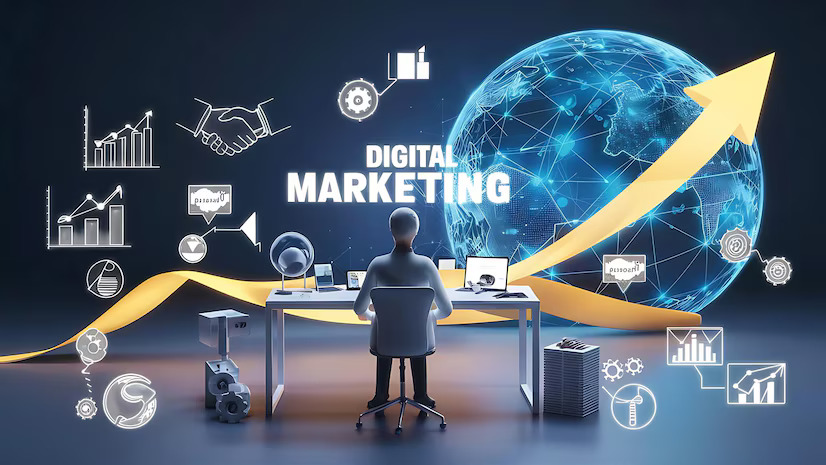


In the dynamic realm of digital marketing, 2024 promises to be a year brimming with opportunities and transformative shifts. As businesses navigate an increasingly digital-first landscape, the demand for skilled digital marketers has never been higher. At Advantage Institute, we delve into the essential skills, burgeoning career paths, and strategic insights that will define success in the year ahead.
Digital marketing in 2024 is not just about mastering traditional techniques; it’s about embracing innovation and adaptation. From content marketing to data analytics, professionals must cultivate a diverse skill set to effectively engage audiences and drive business growth. This blog explores the pivotal skills that marketers need to thrive, offering practical guidance on staying ahead of industry trends and harnessing emerging technologies.
Beyond skills, we uncover the vast array of career opportunities available in digital marketing. Whether you’re drawn to content strategy, data science, or social media management, there’s a niche waiting to be explored. We illuminate current trends shaping these career paths, from the integration of AI and machine learning to the rise of personalized marketing strategies.
Moreover, navigating a successful digital marketing career requires more than technical expertise; it demands strategic foresight and a commitment to continuous learning. Our blog provides actionable strategies for advancing your career, from networking tips to leadership development, ensuring you’re well-equipped to seize opportunities and achieve professional growth.
Join us on a journey into the evolving landscape of digital marketing in 2024. Explore how mastering essential skills, identifying lucrative career paths, and embracing innovation can propel your career forward with Advantage Institute as your trusted guide.
Essential Digital Marketing Skills in 2024
In 2024, digital marketing continues to evolve rapidly, demanding a diverse skill set from professionals aiming to excel in the field. Here are some essential skills:
- Content Marketing Mastery: Effective storytelling and content creation skills remain foundational. Marketers need to craft compelling narratives that resonate with their target audience across various digital platforms.
- Data Analysis and Interpretation: With the rise of big data, proficiency in data analysis tools and techniques is crucial. Understanding consumer behavior through data insights allows marketers to optimize campaigns and drive better results.
- SEO Expertise: Search Engine Optimization (SEO) remains pivotal in driving organic traffic. Knowledge of keyword research, on-page optimization, and technical SEO ensures content visibility and ranking on search engines.
- Social Media Savvy: Social media platforms continue to dominate digital marketing strategies. Marketers should understand platform algorithms, engage effectively with audiences, and leverage paid advertising to enhance brand visibility.
- Email Marketing Skills: Crafting personalized, automated email campaigns that nurture leads and retain customers requires proficiency in email marketing platforms and understanding of customer segmentation.
- Adaptability and Learning Agility: Given the rapid technological advancements, marketers must stay adaptable and continuously upskill. Embracing new tools, trends, and strategies ensures relevance and competitiveness in the industry.
Career Paths in Digital Marketing: Opportunities and Trends
Digital marketing offers a multitude of career paths, each catering to different interests and skill sets. Here’s an overview of promising opportunities and current trends:
- Content Strategy and Management: Roles focused on developing and managing content across digital platforms, ensuring consistency and engagement.
- Digital Analytics and Data Science: Careers centered around interpreting data to optimize marketing strategies and drive business growth.
- Social Media Marketing: Specialists who manage brand presence on social platforms, create engaging content, and run targeted ad campaigns.
- SEO and SEM Specialists: Experts in optimizing website traffic through organic search (SEO) and paid advertising (SEM) strategies.
- E-commerce Marketing: Professionals involved in driving sales through online platforms, optimizing user experience, and implementing effective conversion strategies.
- Marketing Automation and CRM: Roles focused on implementing automated marketing workflows, managing customer relationships, and enhancing overall efficiency.
Current trends include the rise of AI and machine learning in marketing automation, the growing importance of privacy and data ethics, and the shift towards more personalized, customer-centric marketing strategies.
The Role of Data Analytics in Modern Digital Marketing
Data analytics has transformed digital marketing, providing valuable insights that shape strategic decision-making and improve campaign effectiveness. Here’s how data analytics is influencing the industry:
- Performance Measurement: Marketers use analytics to track key performance indicators (KPIs) such as website traffic, conversion rates, and customer acquisition costs, enabling data-driven optimizations.
- Audience Segmentation: By analyzing demographic, behavioral, and psychographic data, marketers can segment audiences more accurately, delivering personalized content and experiences.
- Predictive Analytics: Predictive models help forecast future trends and consumer behavior, allowing marketers to proactively adjust strategies and capitalize on emerging opportunities.
- Campaign Optimization: A/B testing and multivariate analysis enable marketers to experiment with different campaign elements, from ad creatives to landing page designs, to identify the most effective combinations.
- Attribution Modeling: Understanding the contribution of each marketing touchpoint to conversions helps allocate budget more efficiently and optimize the customer journey.
- Real-time Insights: With real-time analytics, marketers can monitor campaign performance instantly, react to changing market conditions, and implement timely adjustments for maximum impact.
Emerging Technologies in Digital Marketing
Technological advancements continue to reshape digital marketing practices, offering new tools and strategies to drive innovation and efficiency. Here are some emerging technologies making an impact:
- Artificial Intelligence (AI) and Machine Learning: AI-powered tools automate routine tasks, personalize customer interactions through chatbots, and analyze vast amounts of data to uncover actionable insights.
- Augmented Reality (AR) and Virtual Reality (VR): These technologies enhance customer engagement by offering immersive brand experiences, from virtual product trials to interactive storytelling.
- Voice Search Optimization: With the rise of voice assistants like Siri and Alexa, optimizing content for voice search queries is becoming essential for maintaining visibility in search engine results.
- Blockchain Technology: Blockchain ensures transparency and security in digital transactions, benefiting industries like digital advertising by reducing ad fraud and improving ad targeting accuracy.
- Internet of Things (IoT): IoT devices provide marketers with real-time data on consumer behavior, enabling personalized marketing campaigns based on users’ preferences and habits.
- 5G Technology: The rollout of 5G networks facilitates faster internet speeds and lower latency, enabling more seamless streaming of high-quality video content and enhancing mobile marketing capabilities.
Building a Personal Brand in the Digital Marketing Field
In the competitive landscape of digital marketing, establishing a strong personal brand can significantly enhance career prospects and credibility. Here’s how marketers can build and strengthen their personal brand:
- Define Your Unique Value Proposition (UVP): Identify your strengths, expertise, and what sets you apart from others in the field. Communicate this clearly in your online presence.
- Create High-Quality Content: Consistently produce valuable content that showcases your knowledge and insights. This could include blogs, videos, podcasts, or social media posts.
- Engage with Your Audience: Actively participate in industry discussions, respond to comments, and engage with followers to build meaningful connections and demonstrate your expertise.
- Network Strategically: Attend industry events, join relevant online communities, and connect with influencers and peers in your field. Networking can open doors to new opportunities and collaborations.
- Maintain a Professional Online Presence: Ensure your LinkedIn profile and other social media profiles are up-to-date and reflect your professional achievements and interests.
- Seek Feedback and Adapt: Request feedback from peers and mentors to continuously improve and refine your personal brand strategy. Stay adaptable to industry trends and adjust your approach as needed.
Strategies for Advancing Your Digital Marketing Career
Advancing your career in digital marketing requires a proactive approach to skill development, networking, and career planning. Here are actionable strategies to help you get ahead:
- Continuous Learning and Skill Development: Stay updated with industry trends, enroll in online courses, earn certifications, and develop proficiency in emerging technologies and tools.
- Build a Strong Professional Network: Cultivate relationships with industry professionals, attend conferences, join professional associations, and engage in networking events both online and offline.
- Seek Mentorship and Guidance: Find mentors who can offer valuable insights, advice, and career guidance. Learn from their experiences and leverage their networks for career opportunities.
- Set Clear Career Goals: Define your short-term and long-term career objectives. Create a roadmap outlining the steps and skills needed to achieve these goals.
- Demonstrate Leadership and Initiative: Take on leadership roles in projects, contribute innovative ideas, and demonstrate your ability to drive results and lead teams effectively.
- Stay Updated with Industry Tools and Trends: Familiarize yourself with the latest digital marketing tools, platforms, and best practices. Experiment with new strategies to stay ahead of the curve.
Frequenlty ASk Question (FAQs)
Q1. What are the most essential digital marketing skills to focus on in 2024?
Answer: In 2024, mastering several key digital marketing skills is crucial for staying competitive. Content marketing remains fundamental, emphasizing the ability to create compelling, relevant content that resonates with target audiences across various platforms. Additionally, proficiency in data analytics is essential for interpreting consumer behavior and optimizing marketing strategies. Skills in SEO and social media management continue to be in high demand, ensuring brands can enhance their online visibility and engagement effectively.
Q2. How can I prepare for a career in digital marketing, considering the rapid industry changes?
Answer: Preparing for a digital marketing career involves continuous learning and adaptation. Stay updated with industry trends through online courses, workshops, and certifications. Develop a diverse skill set that includes content creation, data analysis, and proficiency in emerging technologies like AI and machine learning. Networking with industry professionals and gaining practical experience through internships or freelance projects can also strengthen your candidacy in this competitive field.
Q3. What are the emerging trends shaping digital marketing careers in 2024?
Answer: Several emerging trends are reshaping digital marketing careers in 2024. Personalization through AI and machine learning is revolutionizing customer interactions, allowing marketers to deliver tailored content and experiences. The integration of voice search optimization and augmented reality is opening new avenues for engaging with consumers in innovative ways. Additionally, the focus on data privacy and ethical marketing practices underscores the importance of building trust and transparency with audiences.
Q4. How can digital marketers leverage data analytics to improve campaign effectiveness?
Answer: Data analytics plays a pivotal role in optimizing campaign performance. By analyzing metrics such as website traffic, conversion rates, and customer demographics, marketers can gain actionable insights into consumer preferences and behavior. This data-driven approach enables them to refine targeting strategies, personalize content, and allocate marketing budgets more efficiently. Implementing A/B testing and attribution modeling further enhances the ability to measure the impact of marketing efforts and make informed decisions.
Q5. What role does continuous learning play in advancing a digital marketing career?
Answer: Continuous learning is indispensable for career advancement in digital marketing. The industry evolves rapidly with new technologies and best practices emerging frequently. By staying updated through professional development opportunities and industry publications, marketers can adapt to changing trends and maintain a competitive edge. Continuous learning also fosters creativity, innovation, and the ability to anticipate and capitalize on future opportunities in the dynamic digital landscape.
Conclusion
As we navigate the complexities of digital marketing in 2024, one thing remains clear: embracing innovation and mastering essential skills are key to thriving in this dynamic field. At Advantage Institute, we’re committed to empowering aspiring digital marketers with the knowledge and insights needed to succeed. Whether you’re embarking on a new career path or looking to advance your skills, staying informed, adaptable, and strategic will set you apart. Join us in exploring the limitless possibilities of digital marketing and charting a course towards professional growth and success.





